

Notaires vénitiens au Moyen Orient (1360-1520) - Civilisation et commerce en Méditerranée. Vers la fin du Moyen-Age, Alexandrie était le plus important centre d’échanges sous autorité Musulmane.
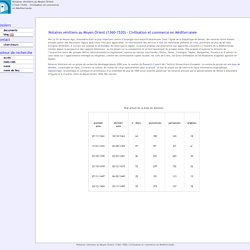
Sous l’égide de la République de Venise, des notaires latins étaient envoyés passer des documents légaux dans cette ville-port égyptienne. Ils fournissaient des services à tous les marchands présents en ville, provenant de plus de 60 lieux d’origine différents. A travers une analyse en profondeur de cette source légale, ce projet propose une alternative aux approches courantes à l’histoire de la Méditerranée, menées depuis la perspective des rapports bilatéraux, ou focalisant sur la composition et le fonctionnement de groupes isolés.
Notaires Vénitiens est un projet de recherche développé depuis 2004 avec le soutien du Research Council de l’Institut Universitaire Européen. Le centre du projet est une base de données, consultable en ligne, à travers un moteur de recherche conçu spécialement pour le projet. Etat actuel de la base de données. Overland Trade. Imagining a territory – Imagined territories. Inspired by the conceptual framework of the French philosopher and sociologist Henri Lefebvre, space has become a key analytical category in recent historiography on religious and secular processions and festivals organised in urban centers in late medieval Western Europe.
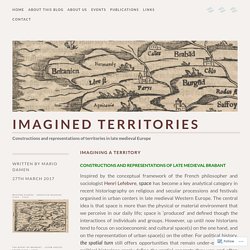
The central idea is that space is more than the physical or material environment that we perceive in our daily life; space is ‘produced’ and defined though the interactions of individuals and groups. However, up until now historians tend to focus on socioeconomic and cultural space(s) on the one hand, and on the representation of urban space(s) on the other. For political history, the spatial turn still offers opportunities that remain under-explored, as political historians rarely define the spatial concepts they use, and often consider the public urban spaces mainly as scaffolds for political events.
In Elden’s view territory is – just like Lefebvre’s spaces – more than simply a bounded or enclosed area. Like this: Home - Istituto Storico Italiano per il Medioevo. Dutch Society for Medieval Archaeology - SMA. MAPS: The Medieval Association of Place and Space. Warwick Network for Parish Research, Dept of History. The 'Warwick Network for Parish Research' has been established to facilitate the study of British and European parishes from the Middle Ages to the present.
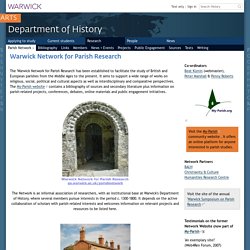
It aims to support a wide range of works on religious, social, political and cultural aspects as well as interdisciplinary and comparative perspectives. The My-Parish website contains a bibliography of sources and secondary literature plus information on parish-related projects, conferences, debates, online materials and public engagement initiatives. The Network is an informal association of researchers, with an institutional base at Warwick's Department of History, where several members pursue interests in the period c. 1300-1800. Early Modern Conversions. ICMA Centre Reading UK. The Economic and Social Research Council (ESRC) awarded Dr Adrian Bell and Professor Chris Brooks a major research grant worth just over £350,000 (RES-062-23-0733) to investigate the early and innovative use of credit finance by a succession of English medieval monarchs.
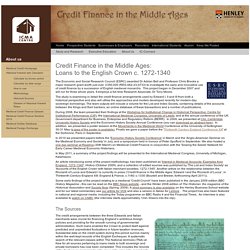
This project began in December 2007 and will run for three whole years. It employs a full time Research Associate, Dr Tony Moore. The study is examining in detail the credit finance arrangements used by Edward I, II and III from both a historical perspective and also will utilise the approaches and models developed recently for modern-day sovereign borrowings. The team outputs will include a volume for the List and Index Society, containing details of the accounts between the Kings and their bankers; an online database of these transactions and a number of publications. In May 2011, a summary of the project findings will be presented to the International Medieval Congress, University of Michigan, Kalamazoo. Imagined Communities. The purpose of this project is to examine various kinds of narratives (recorded in writing and painting) which shaped the collective identities in medieval Europe.
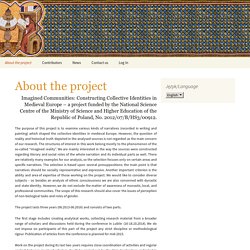
However, the question of reality and historical truth depicted in the analysed sources is not regarded as the main concern of our research. University of Oxford Faculty of History > Research > Project Defining the Global Middle Ages. Until very recently the focus of 'global history' has been on the origins of the modern world.
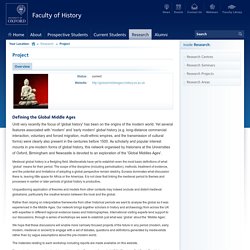
Yet several features associated with 'modern' and 'early modern' global history (e.g. long-distance commercial interaction, voluntary and forced migration, multi-ethnic empires, and the transmission of cultural forms) were clearly also present in the centuries before 1500. As scholarly and popular interest mounts in pre-modern forms of global history, this network organised by historians at the Universities of Oxford, Birmingham and Newcastle is devoted to an exploration of the 'Global Middles Ages'. Medieval global history is a fledgling field.
Medievalists have yet to establish even the most basic definitions of what ‘global’ means for their period. VeleHanden > Projecten > Overzicht. Utrecht Centre for Medieval Studies. Mapping the Medieval Countryside: Properties, Places and People. Home - COST Action. Gli anni della Cupola. Barriers to EUropean Citizenship - bEUcitizen: EUropean Citizenship Research. Archives — Archives, Birkbeck, University of London.
PRIN - La mobilità sociale nel medioevo italianoLa mobilità sociale nel medioevo italiano.